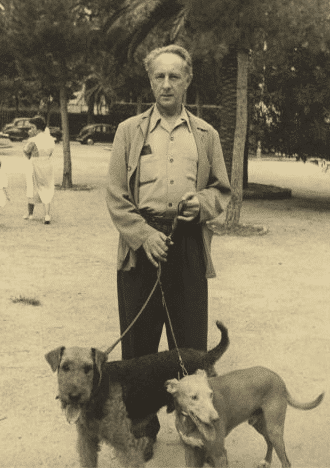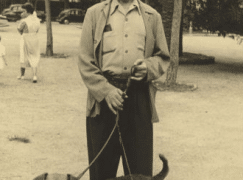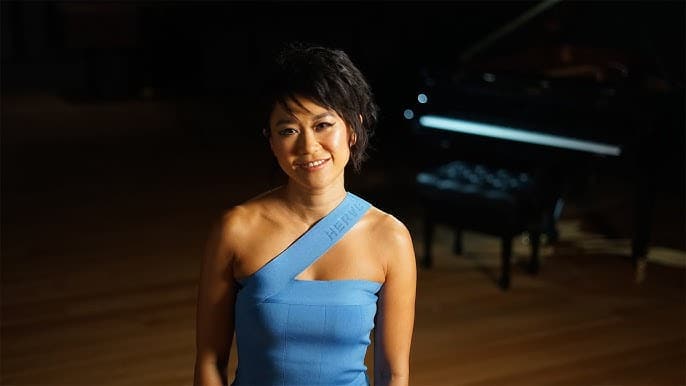A biopic on Bohuslav Martinu
mainOperaplus reports that Czech and Austrian television are coproducing a film about the far-too-neglected composer, as see through they eyes of his French wife, Charlotte.
Definitely one to watch.


Operaplus reports that Czech and Austrian television are coproducing a film about the far-too-neglected composer, as see through they eyes of his French wife, Charlotte.
Definitely one to watch.

Rudolph Vrbsky, principal oboist of the National Symphony…

The British bad-boy violinist, 68 next week, has…

The King has sent a message of support…

The BBC has parked a new interview with…

Session expired
Please log in again. The login page will open in a new tab. After logging in you can close it and return to this page.
Great news, Martinu was one of the most interesting and most gifted 20C composers. His opera ‘Juliettte’ can stand next to the great opera classics without blushing.
“the far-too-neglected composer”
I always find this term, “neglected composers” — that class of composers who are known but who doesn’t belong to the pantheon of must-play composers but not so obscure as to be a unknown — very amusing in today’s push for more diversity and more inclusiveness.
So, leaving aside the demand to play more contemporary composers, more women composers, more minority composers, more unknown-but-just-as-good composers, and even the neglected works of the canonical composers, where is there room for “neglected” composers?
Martinu belongs in the traditional symphonic repertory. The above-mentioned special categories do not. His output alone should determine that. But then, he was white, male, heterosexual and European.
Four categories which he bitterly regretted and which gave him many sleepless nights. He tried to change all of them, but could not succeed. Especially the third damning category worried him gravely. To become a composer – as it should be clearly instructed at conservatories and music faculties – students should make sure to be a member of a minority and suffer from social injustice. Talent is by far not enough and irrelevant anyway for a career.
I gather this is a attempt at satire . . .
If the other minorities will move a bit to the right or left, there may just be a little corner for neglected composers.
Martinu, with Enescu, has been one of my greatest listening joys of recent years – hope to see this very soon.
There is some infrastructure in place to establish Martinu among the great 20th century composers. There is the Bohuslav Martinu Institute, which is undertaking the immense task of publishing the collected edition of his works (106 volumes over 53 years). There are several volumes already completed.
One of my most enjoyable experiences this year has been to listen to all of the works of Martinu available on recording. I also visited the Institute’s website and took advantage of the opportunity to join the International Martinu Circle, which provided me with on-line issues of a high-quality newsletter (the Martinu Revue, published three times a year) that shows that Martinu’s life and works are a fruitful area for research. Early orchestral works have been re-discovered and recorded, and there is also a recording of the complete songs (both thanks to Naxos).
Martinu may be relatively neglected as far as concert performance outside Czechia, but there are various recordings of the cycle of six symphonies to choose from, and it appears that >90% of his works are available through recordings. It does appear to me that Martinu could use a boost in the teaching repertoire – there are works for violin or cello with piano that would make excellent study, and the Three Madrigals for violin and viola and the variations on a Slovak theme are an excellent starting point for this part of his oeuvre.
Speaking as someone who, on occasion, proudly wears his Martinů t-shirt (with one of his own splendid drawings, available from the Martinů Society) perhaps I can add a few words on the subject of Julietta. I went to the first UK performance at the ENO in about 1978 and came away feeling that I had seen a really important work. Over the years I listened on many occasions to the rather good Supraphon recording of the work but my initial enthusiasm gradually waned; I saw the work again in Glasgow in about 2003 (Opera North production) and it was just worth the 500 mile round trip, but it’s not a great opera; the characters don’t evolve as they would in the hands of a master opera composer – add your own names here. Perhaps one of the things that attracted Martinů to the story is that the characters don’t need to evolve during the course of the opera and so his limitations as an opera composer are not exposed. (I remember the excitement when someone realised that Georges Neveux, the author, was still alive in 1978 and so could give his thoughts on the opera.) My preferred choice for Julietta listening is now the wonderful ‘Fragments from Julietta’ with a super cast conducted by Mackerras; you get all you need in less than an hour.
I think the uniqueness of Julietta is that the entire thing is entirely unreal, surrealistic, and happens in a dream world where ‘normal’ character development and ‘normal’ drama simply does not happen, it would take away the dreamy atmosphere. It is all atmospheric and poetic, and looking for concrete meaning and psychological depth and development is as mistaken as looking for a cancan in Wagner’s Ring der Nibelungen.
I think that’s what I was saying; it was a perfect subject for a bit-less-than-great opera composer.
There is no rule for ‘a great opera composer’, so it is a bit pointless and unfair to puh-puh down Martinu.
Alongside the events and structures mentioned above by @REGERFAN, there is one other annual Martinů event not to be missed (unless constrained by the pandemic): the Martinů Festtage in Basel.
https://www.martinu.ch/en/festival-info/
Paul Sacher, the keystone of everything musical in Basel, was a major patron of Bohuslav Martinů, who spent much of his final years in Basel or nearby. Sacher conducted the creation of Martinů’s Epic of Gilgamesh in 1958, and several other major works, some of which are dedicated to him or to his wife Maja.
Here is Paul Sacher remembering Bohuslav Martinů:
https://www.rts.ch/play/radio/les-nouveaux-horizons/audio/paul-sacher-parle-de-bohuslav-martinu?id=7504614
Sacher was almost certainly instrumental in keeping Martinu alive during his six white-knuckle months in 1940 Vichy France (he was actively sought by the Gestapo which had just missed him in Paris) as well as funding the trip to the US. And Sacher’s commissions brought out much of Martinu’s very best work.
We lovers of Martinu owe Paul Sacher a lot.
A nice alternative to the word “neglected” would be “not yet fully appreciated.” Certainly we string players have every reason to be grateful for the rich bounty of solo and chamber music written for us — and always expertly — by Bohuslav Martinů; I am glad I have the Martinů recordings I do, but many of them represent the only way to get the piece, or at least the only practical way, or did at the time. What is interesting is the strong and enthused audience reaction I have heard when his music is programmed in concert, and that included when the Milwaukee Symphony presented his unassertive but charming “Opening of the Wells” cantata. They really should have recorded that piece for Koss Classics rather than the far-too-often redundant stuff the MSO did record under Zdeněk Mácal (a Beethoven’s 9th, a Symphonie Fantastique [true they added in Lélio] , a Dvořák symphony cycle).
Martinů was hardly the only good composer of his era who was, in the opinion of too many of those in a position to make important decisions, on the wrong side of modernism as practiced in his time. I would place Barber (yes, I’d argue much of his best stuff is neglected), Allan Pettersson, and others who kept faith with tonality in that same class. And those three composers are hardly peas in a pod!
All entirely correct. (For instance, Barber’s violin concerto is a great work.) In the course of time, when modernism as an ideology has finally completely petered-out and its adherents found a gruesome end, many 20C works will be rediscovered.
I wonder how personal this bio-pic will be? Somehow, I don’t know if it was an easy marriage or life for Charlotte. Certainly the winds of politics had its affect on them.
A disturbing aspect of neglect: it’s not easy to get even long-term classical listeners to give a try to a composer new to them. The rooted love for Martinu — at least here in the US — seems to exist largely among professional musicians.
But even here things move s o slowly . . . I was amazed to hear my first Martinu on NPR — (I’d long given up) — live, played by two chamber musicians. In an interview, one confessed to being “annoyed” over the years at the continual mention of M’s name, the player wasn’t going out of his way for yet another “unknown.” It was only when his orchestra programmed three performances of an M piece that the man was captured. Repetition sells more than soap.
Meanwhile we are very lucky for the easily-available treasure of Martinu recordings, tremendous in scope, deep in alternate interpretations, thrilling in profound and charged musicianship, so much of it Czech.
The resistence to ‘some unknown composer’ is entirely created by modernism. Before WW II, it was normal that audiences (and performers) were curious for new pieces, and premieres by Ravel, Bartok, Prokofiev, Stravinsky etc. were great occasions with full halls and extensive media coverage.
Now we have Olga:
https://www.youtube.com/watch?v=XhLqMKGZloQ
You may indeed have a point here.
There are a few biographies of Martinu (e.g. Brian Large, Miloš Šafránek) but it is a pity that what I believe is the definitive one is not available in translation.
Mihule, Jaroslav. Martinů: osud skladatele [Martinů: The Fate of a Composer]. Prague: Nakladatelství Karolinum, 2002.
I have been told that there is a Spanish version but I have never been able to find it.
I wonder if neglected is really applicable about Martinu considering the situation for most 20-centuary composers.
Still I suppose we all have one or two cherished composers not getting the amount of recognition we feel they deserve.
Compared with the situation at the time when my fascination for the composer began more than forty years ago, there are really no problems nowadays to get to know Martinus music. Almost everything of interest has been recorded, often more than once, and also most of the music that probably not will stand the test of time. I feel that the crux is rather that Martinu for some reason not has got the position alongside Bartok and Stravinsky where he belongs in Music Dictionaries and among mainstream musicologists. Apart from that I wonder how truthful a film based on Cahrlotte Martinus memoirs ,charming as they are, will be. Probably Roe Barstow and the attack Mrs Martinu launched on her with an umbrella will be left out. As for Milos Safranek, he also was very jealous of Martinu, even trying to sue Harry Halbreich in the process of writing what I think is the most valuable work about Martinus music together with Mike Crumps ” Martinu and the Symphony.”